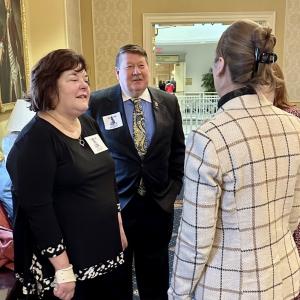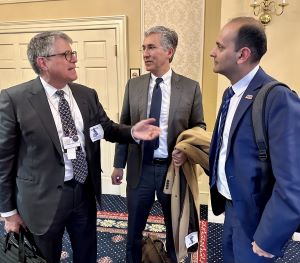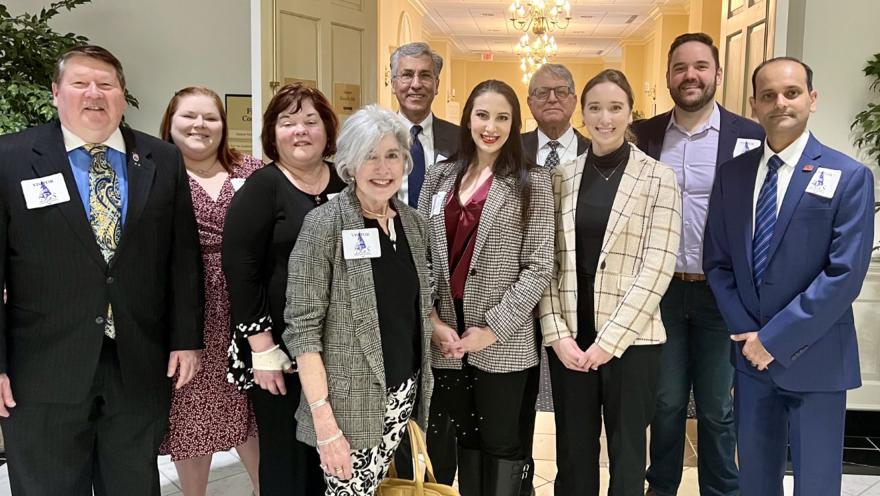The ALS Association is committed to making ALS livable for everyone, everywhere. Yesterday, Association leaders and people currently living with ALS urged Maryland senators to advance legislation that would prohibit companies that offer life and disability insurance from using the results of genetic testing to deny coverage or influence pricing decisions.
“At the federal level, the Genetic Information Nondiscrimination Act (GINA) passed 15 years ago to prevent health insurers and employers from discriminating against an individual, based on their genetic information. Unfortunately, this legislation did not extend to three types of insurances: Life, Long-Term Care, or Disability Insurance,” said Sen. Katherine Klausmeier (D).
“It’s time for Maryland to prohibit these insurers from canceling, limiting, increasing the premium, or denying coverage based on genetic information,” she added.
John Knowles, a caregiver for his wife, Teri, testified about the impact familial ALS has had on his family. Teri's twin sister died in 2013, and another sister died in 2020 after living with ALS. John talked about the need for genetic testing for family members and the fear that the results could be used against them.

“It is sobering when the geneticist doing the testing warns you that if you carry a gene defect linked to ALS, it will likely cause you to either pay higher insurance rates or to be denied insurance altogether. So, they suggest, if you are contemplating getting life insurance, long term care insurance or disability insurance you should get it before you get tested,” Knowles said.
Knowles also talked about the drug development pipeline and the possibility that gene therapy could one day be part of treating and curing the disease.
“Some of these treatments may one day be used to treat non-symptomatic patients who have one of the genetic defects. But without genetic testing, Maryland citizens who could get early proactive treatment won't because they’ve put it off due to concerns about being able to get insurance,” he said.
Dr. Kuldip Dave, vice president of research at The ALS Association, provided Maryland lawmakers with an update on the current state of drug development and the important role that genetic testing could play in treating ALS.

“We are living in an era of unprecedented change in ALS care catalyzed by the discovery of more than 40 genes that either cause or increase a person’s risk of developing the disease. At least 10 therapies targeting ALS-linked genes are being tested in clinical trials with almost a dozen more being developed preclinically,” he said.
Dr. Dave also discussed the need to break down barriers to genetic testing.
“Fear of their genetic information being used against them is one reason why people say they don’t get tested. Thus, the threat of genetic discrimination creates a serious dilemma for Marylanders – risk their physical health because they don’t know their genetic status or risk their financial health because they do,” he said.
Lindsay Gill, managing director of advocacy for The ALS Association who is working on advancing the Genetic Testing Protection Act in Maryland, echoed Dr. Dave’s concerns about the chilling effect the current legal framework has on the willingness of people to pursue genetic testing and called on lawmakers to eliminate that barrier by passing the Genetic Testing Protection Act, SB212.
“SB212 will allay the fear of discrimination that Marylanders may feel when trying to obtain these types of plans. This bill will put protections in place to increase access and affordability of these plans. Genetic testing and genetic counseling are crucial to people living with ALS and it helps to inform earlier diagnosis, treatment, and important life decisions,” she said.
The Maryland House of Delegates is scheduled to hear testimony on a companion bill Feb. 16.
View the full Senate hearing here (fast forward to 3:06:40 to view the panel’s testimony).

